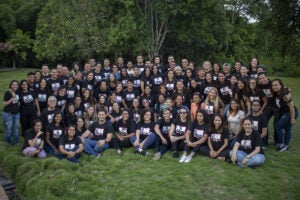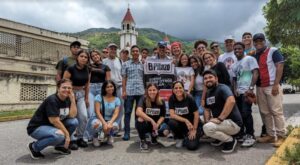Teamwork, that's what Venezuelan journalist César Batiz credits with his recent recognition of the 2025 Knight Award from the International Center for Journalists (ICFJ).
For 10 years, Batiz has led Venezuelan digital media outlet El Pitazo. More than 500 people have passed through its newsroom, and in its early years, it had more than 34 correspondents spread across the country's various regions.
El Pitazo has won several prestigious international awards, including the Ortega y Gasset Prize in 2019 and the King of Spain Journalism Award in 2025 with "Operación Retuit," a partnership of Venezuelan media outlets. This year, the ICFJ Knight Award honors Batiz's individual work.
“Although it's a personal recognition and a recognition of my career, it would have been impossible to obtain it without a team. A team that has given me enough confidence to propose ideas, to be resilient and creative,” Batiz told LatAm Journalism Review (LJR). “Everyone who has worked at El Pitazo is undoubtedly part of this award.”
In announcing the recognition, the ICFJ praised Batiz for his “exceptional courage” and also for his “perseverance in exposing wrongdoing in environments that are incredibly hostile to the press.”
Batiz, who has been in exile for three years, will receive the award on Nov. 13 at a gala in Washington, D.C. Also honored will be Philip Obaji Jr. of Nigeria, who, as a correspondent for The Daily Beast, has covered and investigated abuses committed by Russian paramilitaries in Africa.

More than 500 people have passed through El Pitazo's newsroom, and in its early years, it had more than 34 correspondents spread across the country's various regions. (Photo: El Pitazo).
Before co-founding El Pitazo, Batiz worked as an investigative journalist for Cadena Capriles, one of Venezuela's leading media conglomerates. There, he authored several investigations into corruption during Hugo Chávez's administration, specifically in the country's oil and electricity industries.
His departure from Cadena Capriles coincided with the sale of the conglomerate and the change in the editorial line of its affiliated media outlets. Batiz joined the group of journalists who were forced, due to the changing media ecosystem in Venezuela —including the closure of outlets— to abandon reporting for entrepreneurship.
“I've had the opportunity to learn by doing and to have a team that has allowed me to make mistakes,” Batiz said. “I've made mistakes in human resources management, in administration and in financial matters because, unfortunately, they don't teach you that in communications schools. But it's been a complete learning experience.”
Batiz first founded the Venezuelan chapter of Poderopedia with the Press and Society Institute and then opened El Pitazo, which began as YouTube and Facebook channels that summarized the day's most important news. The team started on Dec. 8, 2014 and launched its website the next April, Batiz said.
El Pitazo was present on its website, social media and even on the radio, with a spot on Radio Capital, a radio station in the Venezuelan capital. In 2017, when its website was getting 100,000 unique users and more than 1,500 visits per minute, it began receiving hundreds of attacks and blockings, so the team sought new ways to stay connected with its audience.
Through workshops across the country, they trained hundreds of “infocitizens” — people who are not journalists but use journalistic techniques to report news and events in their communities. This project is currently on hold due to the "political context," Batiz said.
The El Pitazo team also created Telegram channels and Facebook groups where they received complaints from their audience.
They even explored performance journalism with a monologue based on the investigation "Mujeres en la vitrina" (Women in the showcase), winner of the 2019 Gabo Award. Outside of El Pitazo’s website and social media accounts, they currently continue to connect with their community by sending news audio clips via WhatsApp.
“They closed the door on us, so we grabbed a chisel and hammer and opened new windows,” Batiz said. “We were forced to make that leap from doing traditional journalism through digital media to seeking other avenues of connection, including offline ones.”

Through workshops across the country, El Pitazo trained hundreds of “infocitizens” — people who are not journalists but use journalistic techniques to report news and events in their communities. (Photo: El Pitazo)
At the beginning of the year, El Pitazo had 56 journalists on staff. Currently, there are only 16 people, and they work remotely.
Several factors have influenced this reduction in staff, Batiz said. These include cuts in foreign aid funding, the crisis in the advertising market in Venezuela, changes in the algorithms of large technology companies regarding programmatic advertising, and more.
Batiz said it has been very difficult for them to break even financially, despite various attempts to keep the outlet afloat.
“We’ve tried donations, memberships, programmatic advertising, direct advertising, social media, events, contests, scholarships…” he said.
They are currently working on a classified ad publishing app that will allow them to earn extra income.
Last year, two major advertisers withdrew from its website citing branding issues. However, Batiz maintains that this was due to government threats. The media outlet also has a record of threats to sources.
“We have a great capacity for resilience and innovation, but I'm concerned about the restrictions on sources because state violence is even greater,” Batiz said. “We've seen economists detained, and when you see that, you say, ‘Aha, and now who's going to talk to us?’ It's not just the lack of access to public information or public data, but also the lack of access to organizations or individuals who can serve as sources, especially on issues like the economy, health, crime and violence.”
However, Batiz maintains that Venezuelan journalism has had a significant regional impact, thanks to various alliances and collaborative efforts, and that the country is producing the best journalism possible under the circumstances.
“It's difficult to do journalism in Venezuela because journalists don't just dedicate themselves to journalism,” Batiz said. “Journalists have to figure out how to find medicine for their father, their mother, their sick relatives, how to deal with food, public services and education, and they also have to do their job to the best of their ability.”